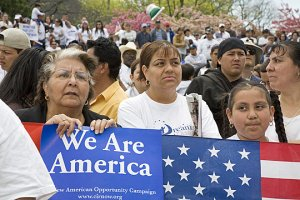After Quiet Summer, Immigrants Form National Alliance for Immigrant Rights

.com

.com
After a relatively quiet summer following this spring’s massive immigrant mobilizations, immigrant workers and their allies are once again mobilizing to demand just immigration legislation. Activists took the streets nationally with protests held over Labor Day weekend, and more held September 30.
Meanwhile, grassroots community and labor activists from across the country met in Chicago and formed a national coalition to coordinate their work. The National Alliance for Immigrant Rights (NAIR) will push for a moratorium on deportations and legalization for immigrant workers.
NATIONAL CONFERENCE
In Chicago, members of the March 10 Coalition—organizers of the massive local march that began the wave of mobilizations this spring—hosted a conference of immigrant workers and their allies August 11-13. More than 700 attendees came from hundreds of unions and community organizations, reporting on activity in cities including Los Angeles, Minneapolis, Providence, Detroit, Phoenix, New York, Washington D.C., Madison, and Pittsburgh.
In response to challenges the movement faces in coordinating its work, conference participants formed the National Alliance for Immigrant Rights (NAIR).“We needed a manner of communication, a way to coordinate action to unify and fight for immigration reform,”said Service Employees (SEIU) organizer and March 10 Coalition leader Jose Artemio Arreola.
The convention promoted ten points of unity. These include demands for a moratorium on deportations, a stance against guestworker programs, and legalization for all immigrant workers. Ignacio Meneses, a Detroit auto worker and immigration activist, said that while not all immigrant organizations support the points of unity, a growing current does.
The Chicago coalition includes labor activists from various area unions. Juan Muñoz, a member of the Laborers’ Chicago council, said that unions need to get involved. He explained, “Unions already have members in the immigrant rights movement. Labor needs to represent the members in the shadows.”
Immigrant rights activists reported that their communities have been wracked with fear due to an increase in anti-immigrant aggression, particularly from law enforcement. Phoenix, Arizona has become a battleground for the immigrant movement. The border, and what to do with undocumented workers once they cross, are daily issues there.

SUPPORT LABOR NOTES
BECOME A MONTHLY DONOR
Give $10 a month or more and get our "Fight the Boss, Build the Union" T-shirt.
One Phoenix activist reported in Chicago, “We are dealing with death on a daily basis, threats from the minutemen, and laws that could give police the right the check for immigration status.”
No-match letters (letters from the Social Security Administration notifying employers that an employee’s social security number could be incorrect) have been tool of intimidation for employers of immigrants. While employers are legally forbidden to use the letters to threaten workers, such laws are often disregarded.
Said Arreola, “We need to work together to fight against the employers that continue to criminalize us with deportations and no-match letters. We need to put a stop to no-match letters now.”
LABOR DAY ACTION
In Chicago, more than 5,000 people attended an Immigrant Workers Justice March over Labor Day weekend. The four-day, 45-mile march from Chicago to Batavia, Illinois ended at the office of U.S. Speaker of the House Dennis Hastert.
Organizers targeted Hastert for his role in pushing legislation that would beef up border security and threaten immigrant workers.
Becky Belcore of the Korean American Resource and Cultural Center was part of the planning committee that brought out 500 demonstrators from the Asian community. Says Belcore, “We wanted to raise the profile of Asians in the immigrant rights movement.”
Belcore marched the entire 45 miles, accompanied by Korean drummers commonly used in Korean trade union protests. Said Belcore, “Marching so long with everyone allowed for a deeper sense of community; it was an incredible experience.”




